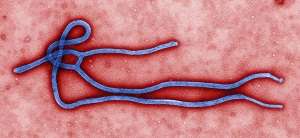 |
| Ebola virus under an electron microscope--Courtesy of CDC |
As the death toll from the Ebola virus in West Africa climbs to 135 people, a vaccine to combat the deadly virus remains years out of reach.
With a lack of funding and relative infrequency of the disease, the global health community could be unprepared to deal with such outbreaks in the future.
First confirmed in Guinea in March, the outbreak has spread to Liberia with suspected cases in Mali and Sierra Leone. As of April 16, Guinea's Ministry of Health has reported 197 cases of Ebola, including 122 deaths. Meanwhile, in Liberia, the country's Ministry of Health and Social Welfare has confirmed 27 clinical cases, including 13 deaths.
The virus is an extremely severe disease that causes hemorrhagic fever and has a case fatality rate of up to 90%. First detected in 1976, Ebola it is one of the world's most virulent diseases, according to the World Health Organization, and there are currently no drugs available to treat it.
Ebola's lack of commercial promise and the rarity of the disease have contributed to its unpopularity as a potential drug target. Its high virulence and death rate also make it difficult for researchers to study. As such, much of the backing for Ebola drug research comes from government funding, like a $28 million NIH grant announced in March to establish a new center to find an antibody cocktail to fight Ebola. The collaboration spans 15 institutions, headed by investigators at The Scripps Research Institute.
For decades, scientists believed no antibodies to be effective against Ebola virus. But in 2012, research from the U.S. Army Medical Research Institute of Infectious Diseases showed otherwise. Researchers found that a mix of antibodies can stop the virus. Other scientists around the world were also having success testing similar antibody cocktails.
Classified as one of the highest priority bioterrorism agents, Category A, by the Centers for Disease Control and Prevention, the U.S. government has invested $140 million into anti-Ebola efforts through a Department of Defense contract with Tekmira ($TKM), which began human trials of its RNAi drug in January.
Elsewhere, BioCryst Pharmaceuticals ($BCRX) and an Army medical team are also working on an experimental therapy against Ebola and Marburg, and GlaxoSmithKline ($GSK), Inovio Pharmaceuticals ($INO) and Vaxart all have potential Ebola vaccines in preclinical stages.
- here's the latest on the outbreak from WHO